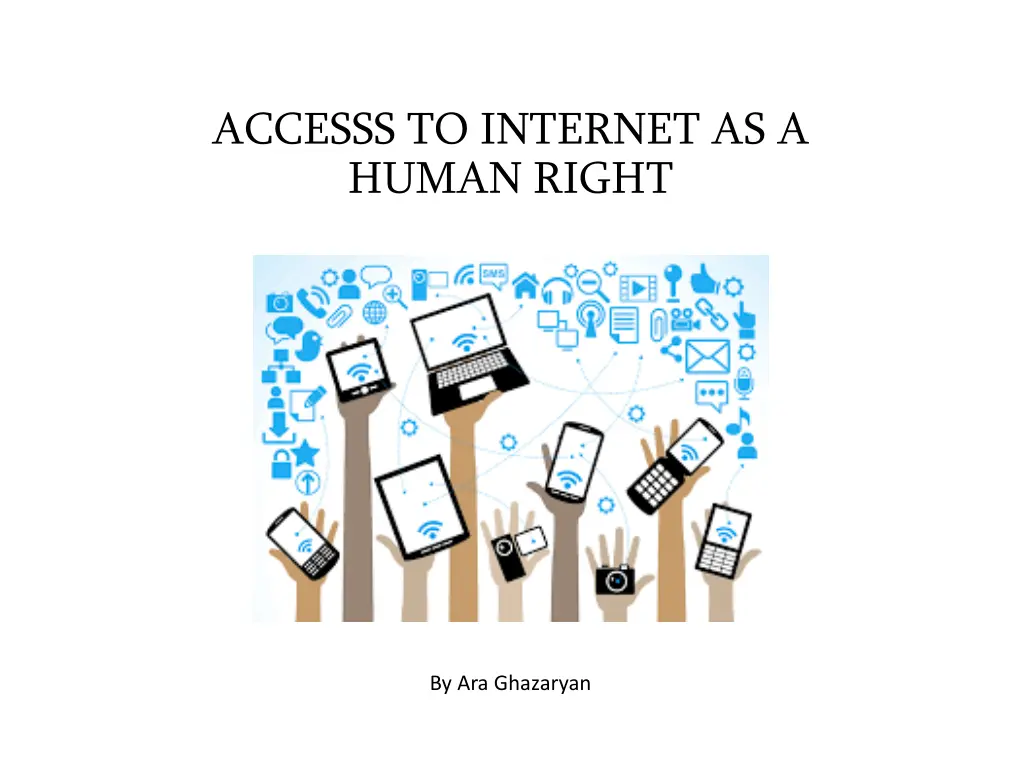
Access to Internet as a Fundamental Human Right: Global Perspectives and Obligations
Explore the global recognition of internet access as a fundamental human right, backed by UN initiatives and reports from OSCE and ECHR. Understand the positive obligation of governments to ensure universal access, considering internet's crucial role in human rights, development, and equality.
Download Presentation

Please find below an Image/Link to download the presentation.
The content on the website is provided AS IS for your information and personal use only. It may not be sold, licensed, or shared on other websites without obtaining consent from the author. If you encounter any issues during the download, it is possible that the publisher has removed the file from their server.
You are allowed to download the files provided on this website for personal or commercial use, subject to the condition that they are used lawfully. All files are the property of their respective owners.
The content on the website is provided AS IS for your information and personal use only. It may not be sold, licensed, or shared on other websites without obtaining consent from the author.
E N D
Presentation Transcript
ACCESSS TO INTERNET AS A HUMAN RIGHT By Ara Ghazaryan
Is access to internet a fundamental human right ? If so, does the government have positive obligation to ensure that everyone has access to internet
UN World Summit on the Information Society UN World Summit on the Information Society December of 2003 common desire and commitment to build a people-centered, inclusive and development-oriented Information Society, where everyone can create, access, utilize and share information and knowledge, enabling individuals, communities and peoples to achieve their full potential in promoting their sustainable development and improving their quality of life, premised on the purposes and principles of the Charter of the United Nations and respecting fully and upholding the Universal Declaration of Human Rights.
OSCE OSCE Survey among states 2008-2010 Do the States have: Yes - 30.3% No - 51.8% 1.specific legal provisions on the right to access the Internet 2. general legal provisions which could restrict users access to the Internet. No 69.6% Yes 12.5% 5 bln. The number of worldwide users: It means access to internet has universal recognition. Everyone has the right to participate in the information society. The state has a responsibility to assist in the advancement of it.
UN special rapporteur report UN special rapporteur report Frank La Rue May 2011 Internet enables individuals to seek, receive and impart information and ideas of all kinds - instantaneously and inexpensively across national borders, while the Internet has been in existence since the 1960s, it is the way people now use the Internet, across the world and across age groups, with "incorporation into virtually every aspect of modern human life," that makes the Internet an unprecedented force, indispensable tool for realizing a range of human rights, combating inequality, and accelerating development and human progress,
ECHR caselaw ECHR caselaw 27. The Court has consistently emphasized that Article 10 guarantees not only the right to impart information but also the right of the public to receive it In the light of its accessibility and its capacity to store and communicate vast amounts of information, the Internet plays an important role in enhancing the public s access to news and facilitating the dissemination of information in general. The maintenance of Internet archives is a critical aspect of this role and the Court therefore considers that such archives fall within the ambit of the protection afforded by Article 10. Times Newspapers Ltd. v. United Kingdom (Nos. 1 and 2) (2009) http://hudoc.echr.coe.int/eng?i=001-91706
ECHR caselaw ECHR caselaw Google service constitutes a means of exercising freedom of expression ( 49). TheT B blocked access to the entire Google Sites domain, thereby incidentally preventing the applicant from accessing his own website He can therefore legitimately claim that the measure in question affected his right to receive and impart information and ideas ( 51). The Court considers that, whatever its legal basis, such a measure was bound to have an influence on the accessibility of the Internet and, accordingly, engaged the responsibility of the respondent State under Article 10 ( 53). Ahmet Yildirim v. Turkey (2012) http://hudoc.echr.coe.int/eng?i=001-115705
Thus, access to internet is recognized as fundamental human right under free speech doctrine
How the access of users is affected How the access of users is affected Content Blocking Content Filtering Content Removal
Blocking Blocking Measures taken to prevent certain content from reaching an end user. The content remains but users cannot reach to it and see it. This includes blocking: IP blocking - block all traffic to a set of IP addresses DPI list of content to block identified by keywords or image matching, URL blocking blocks URL web traffic identified by category (e.g. sports) Platform-based blocking e.g. Facebook, Youtube DNS blocks domain names
Filtering Filtering Configured blocking of content based on categories and sub-categories. Difference between filtering and blocking example: (emails) A filtering software lets unsolicited e-mails with offending content to land in your inbox but then automatically removes them to another folder (spam folder or trash folder) that you have created. A blocking softwire prevents such emails from reaching your account. They are rejected and therefore do not land in your inbox, spam folder or any other folder that you may have created.
Removal Removal Removal means taking down the content from the internet. If blocking and filtering presumes that the content stays but the user cannot reach and see it, the removal means the content is taken down from the cyberspace.
